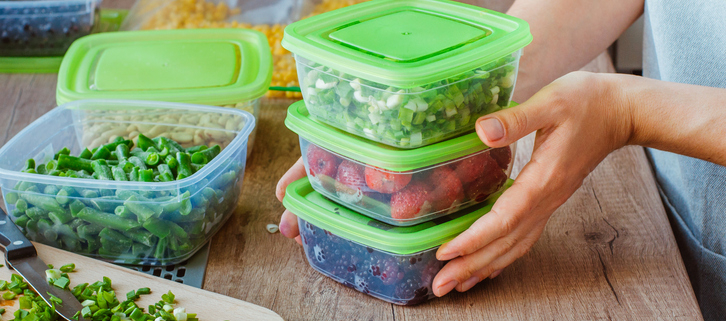You’ve probably heard of BPA when shopping for things like water bottles, food storage containers, and even in your cosmetics like lipsticks, eye and face makeup, and nail lacquers. But do you know what it is and how it affects your health?
BPA, or Bisphenol A, was initially developed to be used as an estrogen-like compound for the pharmaceutical industry. BPA was later used to manufacture plastics, and the plastic industry exploded in the 1950s. The chemical was presumed to be safe by the Environmental Protection Agency in the 1970s, with few animal studies in doses not relevant to humans. BPA leaches out of plastics long after it is produced, and there are no requirements for companies to prove its safety.
BPA and Health
BPA is an endocrine disruptor, meaning it mimics or interferes with the body’s endocrine system. Even in low amounts, exposure can alter the body’s endocrine system and lead to health concerns such as breast and other cancers, reproductive problems, obesity, heart disease, and behavioral changes.
BPA has been shown to decrease egg quality and a reduced ability of an embryo’s successful implantation in women. Some research has demonstrated infertile women have higher BPA levels. Elevated BPA seems to adversely affect estradiol levels, the number of eggs produced, egg quality, fertilization rates, and embryo quality. Increased levels of BPA may decrease the success rate of IVF treatments. [R]
Multiple studies have correlated BPA exposure with a reduction in various characteristics of sperm quality. Sperm concentration, total sperm count, and morphology were a few of the traits affected [R] Researchers found that BPA can affect sperm integrity even at low levels.
Steps to Reduce BPA in Your Life
- Ditch the Plastics. At the store, you will commonly see the claim “BPA-free” on products, but that doesn’t necessarily mean it’s safe. When BPA became a customer concern companies started exploring the idea of using other Bisphenols, like BPS, as a substitute in order to place the label BPA-free on the label as a marketing tool. It is much cheaper for a company to replace the chemical in question with another chemical rather than safely reformulate it. While there are fewer studies on replacement bisphenols, evidence shows very similar side effects in those exposed to BPA. Other things to look for and avoid in plastics are PolyCarbonates (“PC”) or recycling code #7, as these may contain BPA.
Seek alternatives such as glass or stainless steel water bottles, glass food storage containers, or natural food wraps such as beeswax for bringing lunches on-the-go.
- Choose Fresh or Frozen Over Canned. Fresh, organic, locally grown, in-season produce is best when available. Otherwise, choose fruits and vegetables that have been flash-frozen to protect as many of their benefits. Canned fruits and vegetables may be at risk of exposure to BPA, which is often found inside the can linings.
- Practice Clean Beauty. A database of safe cosmetics and body care products can be found on Skin Deep, provided by the Environmental Working Group. EWG is a non-profit, non-partisan organization dedicated to protecting human health and the environment. Some of the health and personal care products contained in the database are EWG Verified, meaning the products are free from harmful chemicals, provide full transparency in labeling, and follow good manufacturing practices. Other products rated on a scale from 1 to 10 indicating least to most damaging in terms of your health. BPA is one of the many toxins EWG screens.
- Limit Your Exposure to Receipts. Paper such as sales receipts, plane, and concert tickets all have a BPA coating that gives them that smooth texture. If your employment causes you to come in contact with a large volume of receipts, it’s essential to protect yourself from BPA exposure. You may ask to work with gloves and, if this is not an option, be sure to wash your hands often. If you are a consumer, you can limit your exposure by asking for an emailed receipt whenever possible, declining receipts you don’t need (this will help the environment too!), or by handling the receipt as little as possible and washing your hands with soap and water as soon as you are able.
- Avoid Use of Hand Sanitizers. Hand washing is always preferred to hand-sanitizer. However, due to COVID-19 and flu season around the corner, hand-sanitizer seems to be everywhere. When soap and water isn’t an option, use it, but know that hand sanitizer can increase absorption of BPA after touching receipts into your body of 10-100X! That’s an alarming percentage; stick to soap and water as a best practice.
Reducing or eliminating toxins, such as BPA, is an easy step you can take at home to begin steps to a cleaner lifestyle. There are many other components to integrative medicine that can impact fertility that I suggest to patients. You can learn more from my eBook, download it today.



